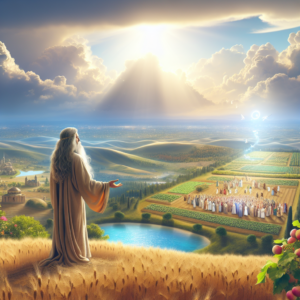Spiritual Devotional about Rituals of Passage
Title: Embarking on Life’s Sacred Journey: Embracing Rituals of Passage with Joy and Faith
Greetings, beloved friends! Today, let’s embark on an enriching journey as we explore the profound and transformative world of rituals of passage. These meaningful milestones are more than just ceremonies; they are sacred gateways that guide us into new phases of life, infused with divine purpose and a renewed sense of identity. Just as shepherds use landmarks to guide their flocks through unknown terrain, our spiritual rituals serve as markers of faith, growth, and connection.
In many cultures and spiritual traditions, rituals of passage are an intrinsic part of the tapestry of life, weaving us into the fabric of community and tradition. Whether it be baptisms, weddings, bar and bat mitzvahs, confirmations, or other significant celebrations, these moments are opportunities to pause, reflect, and rejoice. They prepare the heart, spirit, and mind for what lies ahead, grounding us in our faith and identity.
A Biblical Perspective on Rituals of Passage
The Bible is rich with illustrations of rituals that honor milestones in one’s spiritual journey. One of the most poignant examples is the baptism of Jesus. In Matthew 3:16-17, we read how Jesus came to John at the Jordan River. As He was baptized, the heavens opened, and the Spirit of God descended like a dove, with a voice from heaven saying, "This is my Son, whom I love; with Him, I am well pleased." This pivotal event marked the beginning of Jesus’ public ministry and symbolized His role as God’s beloved, fully ready to embrace His divine mission.
Rituals of passage like baptism remind us of our identity as beloved children of God, commissioned to spread light and love in the world. They serve as affirmations of our faith, calling us into deeper relationships with God and each other.
Infusing Joy and Faith into Our Rituals
To fully embrace these sacred moments, we must enter them with joy and faith. Here are some ways to deepen the spiritual experience of rituals of passage:
-
Embrace Community: Surround yourself with a supportive community that loves and uplifts you. Just as the early church gathered to celebrate each other’s journeys, lean on those who walk similar paths of faith, allowing their presence to magnify the sacredness of your occasion.
-
Reflect and Pray: Take time to reflect on the significance of the passage. Pray for guidance, wisdom, and strength as you cross this threshold. Invite the Holy Spirit to illuminate your path and instill peace and purpose in your heart.
-
Celebrate with Gratitude: Rejoice in the beauty of the moment and the blessings bestowed upon you. Cultivate a heart of gratitude, recognizing the abundance of grace that surrounds you. Express thanks for the journey and the growth yet to come.
-
Live Out the Transformation: Let the experience transform you. Carry the lessons, insights, and grace into your everyday life. Be a beacon of the love, joy, and faith you celebrated, glorifying God through your actions and relationships.
Inspiring New Beginnings
As you partake in the rituals of passage in your life, may you be inspired by the underlying truth that each is a divine adventure, a call to new beginnings steeped in hope and promise. Let the knowledge that God orchestrates every step fill your heart with anticipation and trust.
Remember, you are never alone. The same God who was with Jesus at His baptism journeys with you, offering encouragement, love, and affirmation every step of the way. Each ritual is a reminder of your sacred worth and the incredible future God has prepared for you.
With hearts open to His divine plan, let us step boldly into our new seasons of life, celebrating the beauty and wonder of these sacred passages with unwavering faith. Here’s to new beginnings filled with joyous blessings! 🌿✨
In faith and joy,
[Your Name]
Explore and dig up answers yourself with our BGodInspired Bible Tools! Be careful – each interaction is like a new treasure hunt… you can get lost for hours 🙂
Q&A about Rituals of Passage
Certainly! Below is a Q&A that explores the concept of rituals of passage:
Q1: What are rituals of passage?
A1: Rituals of passage are ceremonies or rites that mark significant transitions or milestones in an individual’s life. These rituals often signify a change in status, age, or role within a community or society. Common examples include birth, coming of age, marriage, and death.
Q2: Why are rituals of passage significant in various cultures?
A2: Rituals of passage are significant because they help individuals and communities to navigate and acknowledge major life changes. They provide structure, meaning, and continuity, and often reinforce cultural values and social bonds. These rituals can facilitate the transition by providing a sense of security and belonging.
Q3: Can you give examples of common rituals of passage?
A3: Yes, some common examples include:
- Birth rituals: Baptisms or naming ceremonies.
- Coming-of-age rituals: Bar/Bat Mitzvahs in Judaism, Quinceañeras in Latin American cultures, and Sweet 16 parties in the United States.
- Marriage rituals: Wedding ceremonies, which can vary widely between cultures.
- Death rituals: Funerals or memorial services.
Q4: How do different cultures approach coming-of-age ceremonies?
A4: Different cultures have distinct coming-of-age ceremonies. For example:
- In Judaism, the Bar Mitzvah or Bat Mitzvah marks a Jewish boy or girl’s entry into religious adulthood at age 13.
- The Apache Sunrise Ceremony is a rite of passage for young Apache women, symbolizing their transition into womanhood.
- In some African communities, initiation rituals involve seclusion, education, and ceremonies that mark the transition from childhood to adulthood.
Q5: Are modern societies losing traditional rituals of passage?
A5: While some traditional rituals may be less emphasized in modern societies, they are not necessarily being lost. Instead, they may be evolving or integrating with modern elements. Many people still find value in maintaining these rites, while others might create new rituals that better reflect contemporary values and lifestyles.
Q6: How have globalization and technology influenced rituals of passage?
A6: Globalization and technology have allowed for the blending and adaptation of rituals. People can now incorporate elements from various cultures into their ceremonies, and technology enables wider participation through virtual ceremonies. However, these influences may also lead to the dilution or transformation of traditional practices.
Q7: Can rituals of passage be personalized?
A7: Yes, many people choose to personalize rituals of passage to better align with their beliefs, values, and individual circumstances. This could involve altering traditional elements, incorporating modern practices, or creating entirely new rituals to mark important life transitions.
Q8: What role do rituals of passage play in community building?
A8: Rituals of passage strengthen community ties by bringing people together to witness and participate in significant life events. They foster a shared identity, reinforce collective values, and can enhance social support networks. These ceremonies often involve community members acting as witnesses and providing guidance and support to the individual undergoing the transition.
If you have further questions or need more elaboration, feel free to ask!


